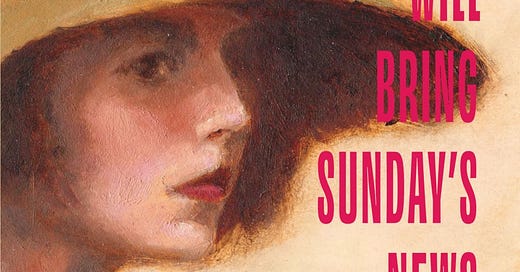The best-written work from our subscribers' submissions: Tomorrow Will Bring Sunday's News by Beth Kephart
Read the opening pages below
She lies in her bed, in her room, listening: the glug in the gutter.
The calico across the narrow of the street, new to its own mew. October 21, 1969. Yesterday sound was the yellow fur of the sun behind the room where she lies. It was the sound of the basketball in the park past the alley, slapped against the ground so many times by an invisible hand that she would have done anything to crush it into silence, but what could she do? Who would carry her the distance, lift her head, find her words, and besides, it is raining now. The pleasing pattering of liquid weather.
Her mattress has been rutted by the long lengths of her illness. She feels, beneath her, the places her bones and flesh have been, the four depressions of the breakfast tray that her husband brought during the many months when she could still eat, or really just sip, a little. Beef broth. Orange-flavored Jell-O. Chocolate milk. Applesauce that her daughter made with the ripe McIntoshes and the hard sticks of cinnamon. Here we are, her husband would say, settling the pretty painted tray down among the white sheets, applying just enough pressure that the round feet of the wooden legs would become indelible in the deflated mattress.
Had he sat with her on the edge of the bed, the pretty painted would have gone sideways—lost its footing, tipped, released the bowl, the glass, the dish, the slosh onto the sheets he’d stopped washing, for she no longer had the strength to help him strip them from beneath her. To move to this side. To move to that side. To not get lost inside the puzzle of staying put but moving.
True, he might have brought the cushioned rocking chair with the string doily from the other room and sat right there, the two of them, together. He might have talked or hummed or listened, like she listened, to the weather. But that would have surprised them both, and they were long past surprises—the news of her illness being tired and ancient, his desire to keep living not—what is the word?—poignant? His desire to keep living was—here is the word—paramount.
A terrific paramounting wish. She makes new words now. Sluices others.
Besides: Whatever it was he’d cooked up for himself—pineapple ham, rosemary chicken, his famous meatballs and spaghetti—awaited (he was hungry) down the hallway, past the paintings, down the stairwell, in the dining room, the one room with the tall, wide window that looked out upon the alley, past the alley into the park. She’s stopped picturing him alone at the big old table that never fit in that room to begin with. She’s stopped thinking of the furniture that once held in a tight squeeze all the world that was theirs—their children, their grandchildren, their Thanksgiving, and their Easter. She’d been a woman who had laughed behind her hand. He’d been a man who’d saved enough, and proudly, for the pure gold tooth that replaced the broken molar. He’d smiled so that everyone could see it.
A cloth napkin tucked in at his pressed collar. His sleeves pulled up by the wide rubber bands at his elbows. An immaculate man. From the beginning of them. How little she ever learned about who he was before her.
She, too, had kept her secrets.
Not this thought. Not now. There is no time for wishing. There hardly ever was. She’d lived the alternate story, and this is the end of it.
The rain falls. It is her sound.
Her sigh barely lifts the bones of her chest.
More information on the book US/Canada »
UK/Ireland »
We’ll soon be publishing Kephart’s guide to prose technique.
Submitting work to Auraist
We offer writers a fast-growing audience of tens of thousands of discerning readers, including many world-class writers, major publishers and literary agencies, and journalists at the highest-profile publications.
If we publish your work, we’ll invite you to answer our questions on prose style. Your answers will be considered for inclusion in the print publication of these pieces by many of the world’s best writers.
The following submissions are welcome:
Books published in the last year
Works serialised on Substack
Start the process by signing up for a paid subscription below. Then email your work to auraist@substack.com.
We look forward to reading it.






